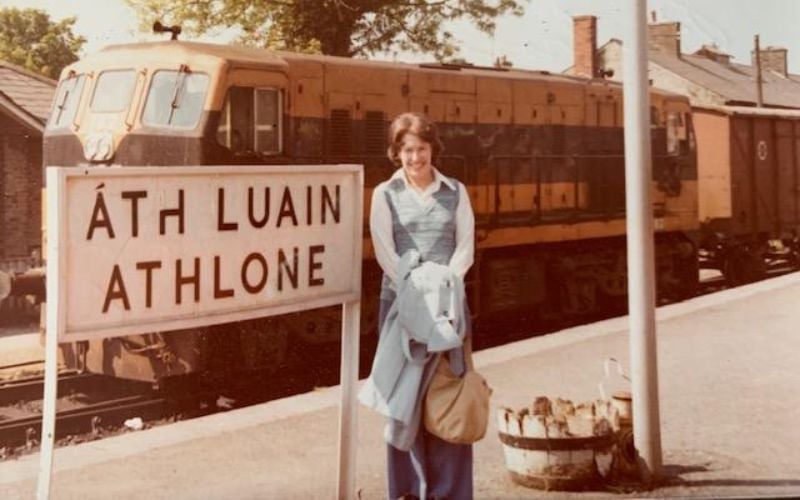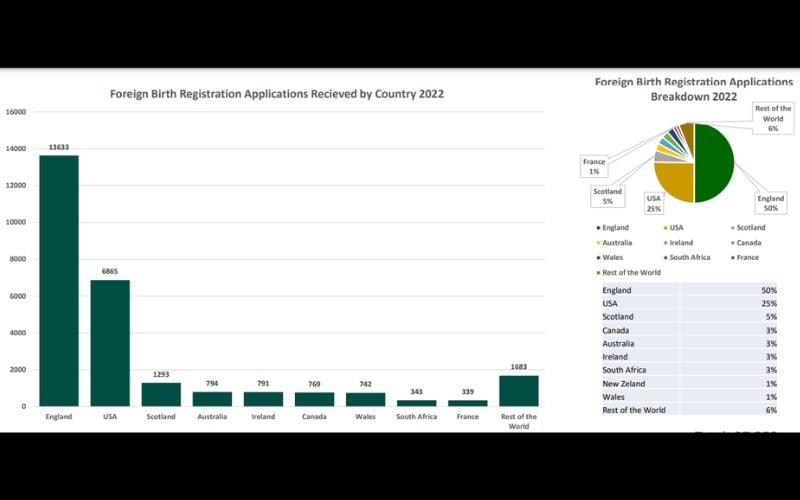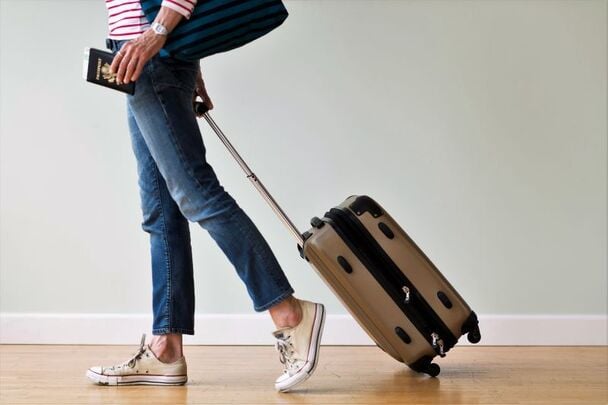When I started thinking about this article, America was faced with the very real possibility of a Trump second term. Polls had the former president, a convicted felon, leading. Democracy was taking a beating. I took comfort in the fact that I had a Plan B in place.
While in Dublin for Bloomsday in 2016, the prospect of a Trump presidency first loomed, but I didn’t take him seriously. As a native New Yorker, he was always a bigoted buffoon from some crappy TV show. He was not my primary motivation to register my foreign birth. I applied for citizenship to honor my grannies and auntie who all emigrated from Co Roscommon - Athlone and Castlerea.

Author’s Mom visiting her mom’s hometown in the 70s.
Also at that time, another political shift was afoot with England soon to vote on Brexit. Busy year for political disasters.
I dropped off my Foreign Birth Registration application at the Department of Foreign Affairs Offices ahead of the Brexit rush. A few months later, I was an Irish citizen.
As proud of my Irish heritage as I am, I will always be an American when looked upon by Irish eyes. Always a blow-in. I understand and accept that attitude. However, I value my dual citizenship proudly.
With all the recent turmoil in the States, I assumed that Americans were flocking to Ireland. That is not the case.
There are some 30 million Americans who claim Irish heritage, according to US Census data. According to a spokesperson for Ireland's Central Statistics Office, only some 5,900 Americans migrated to Ireland in 2023. Surprisingly, that figure is fairly consistent for the last five years. The highest figure was 6,700 in 2019, towards the end of the Trump error.
Ireland has changed radically from a country of emigrants to a desirable country for immigrants. Now, 50% of immigrants to Ireland come from across the sea - the Irish Sea. In 2022, Britain accounted for 50% of Irish immigrants. Not surprising given that Great Britain was the number one emigration destination during the 70s and 80s.

Recent immigration by country of origin.
The fact that only 5,900 Americans immigrated last year is surprising to me. Given the diaspora and Ireland’s fairly liberal citizenship possibility by registering a foreign birth, why haven’t more Americans moved? I suspect that a Plan B is a good thing to have but something truly drastic has to happen to execute it. Could VP Harris be the X-factor that will keep Americans at home?
In spite of the smallish numbers, Americans are moving to Ireland in different manners, e.g., foreign birth registration, employment permits, student permits, spouses/partners of citizens, and retirees.
Here are some of their stories that highlight their plans and reasons for moving to Ireland.
“Work to live not live to work"
One American with dual citizenship - the golden ticket - summarized Ireland’s appeal for her and family as “a work to live, not live to work attitude, protection of the environment, a social safety net, science-based decisions, religion not a factor, no guns and less racism.”
The former researcher for the US government spent time in Ireland as a child and moved with her children and husband. She cited changes in the US government as factors in their decision to immigrate. She was not alone in that observation.
“My daughter might lose her reproductive rights”
In the process of registering his foreign birth, another American also said that the direction of the US government, politically and socially was going wrong. He feared that his daughter’s reproductive rights were at risk and was concerned about the loss of other rights. He has visited Ireland multiple times and feels that he will be able to import his successful home improvement business after acquiring dual citizenship.
“There is less economic pressure when starting a family”
A “mixed” young couple, she’s an American and her husband is an Irish citizen who also became an American, decided to move from the San Francisco area because they did not think it economically viable to start a family, buy a house, and live comfortably in the US.
While going through the Stamp 3 process, she was delighted to be able to actually talk face-to-face with immigration officials. Comparing her husband’s process to get his US citizenship, she said it was less expensive and easier for her to move towards naturalization.
They also leveraged her husband’s citizen status so that they were able to buy a house in Ireland prior to immigrating.
“I cry when I leave. I cry when I return.”
This American has fallen hard for Ireland. Pursuing a PhD at Trinity College - student visa - she feels a spiritual connection with the country and a shared embrace of a kinder, gentler society.
“The democracy that is being practiced in the United States, regardless of who is in charge, is driven by capitalism and consumption with very little regard for how that impacts the rest of the world. It became untenable," she said.
Said simply, her decision to relocate to Ireland was "climate, guns, and cars.”
The advice she offers to others thinking of moving to Ireland is: “They’ll welcome you with open arms but it will be very challenging because there is this illusion that it will be easy.”
But it was worth it, especially noting her embrace of the craic of ocean swims.
“I want to be here as much as possible"
Even after a 30-year absence from Ireland after his initial visit, this American is perfectly comfortable with his status as a retiree and homeowner. After deciding not to pursue dual citizenship or visiting as a tourist, he opted to apply for a Stamp 0.
“I wanted to come and go … without counting days," he said.
“Citizenship isn’t as important as being able to enjoy life in Ireland.”
He planned his renewals so that he could spend “five years of Christmas’ in Ireland.”
“I think I’m going to live longer here.”
Another retiree, this former corporate auditor feels a strong spiritual connection and appreciation of her quality of life. Her plan was always to retire in Ireland.
“If there is a god, he’s in County Kerry," she said.
Her decision to retire and remain in Ireland was heartfelt. “Your ancestors are calling you home and you feel connected to Ireland.”
She has owned property on the isle for 20+ years.
Similar to others, she said: “I don’t like how our country (US) has been torn apart the last few years.”
“Our experience growing up in America has been a mess"
Commenting on their experiences growing up in America of late, this young couple - he through an Employment Permit and she through Stamp 3 - are looking for community and a kinder society.
Both are highly skilled healthcare professionals - doctor and pastoral counselor. In the States, “Our jobs are supposed to be taking care of people … we don’t have the resources we need to help the people we’re supposed to help. It’s hard to be so ineffectual.”
He went through the Stamp 1 certification process for medical doctors which took a year of submissions before receiving an employment contract. They also mentioned that their experience of growing up in America of late “has been a mess,” citing active shooter drills in school and the aftermath of 9/11.
As a teenager in Colorado after Columbine, she recounted the experience of a SWAT team breaking into her classroom and having a gun pointed at her face. They are looking forward to joining a smaller-scale community as they start their professional lives.
Although from different parts of America and of different generations, these Americans share common concerns and characteristics. They have all spent time in Ireland - be they extended holidays, visits with relatives, exploratory excursions - prior to making the decision to move. All are well-traveled and well-educated. And both those with dual citizenship and those moving through the Stamp process are monied.
If the Irish government’s immigration policy was a marketing initiative, it has identified a very desirable demographic. Politically and socially compatible, educated people with the necessary resources who are motivated to move.
In speaking with these Americans, invariably at some point during the interview there would be a pause and then the word - magical - would surface. I’ve felt it many times during my visits and knew exactly what these Americans meant. Even though the PhD candidate admitted that the weather in her first “February and March nearly broke me," she rallied and now Ireland is her ultimate destination - as if guided by magic.




Comments